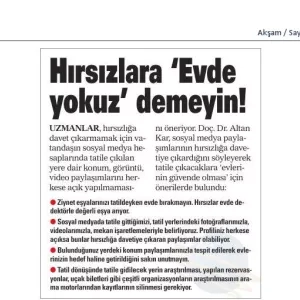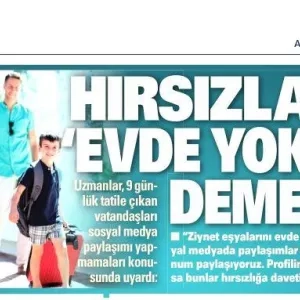Holiday Travel Safety Tips: Ensuring Home Security

Holiday Travel Safety Tips: Ensuring Home Security
Assoc. Prof. Dr. Altan Kar, Head of the Department of E-commerce and Management at Yeditepe University's Faculty of Economics and Administrative Sciences, has warned that social media posts on vacation could invite burglaries.
In an interview with an Anadolu Agency reporter, Kar emphasized the importance of taking precautions to secure possessions at home during holiday seasons, particularly when individuals are away. "We can summarize these precautions in two main categories," he noted. "It is crucial for citizens to ensure that energy sources such as electricity, water, and natural gas are turned off when they leave their homes. Shutting these off before departing is vital. Some devices can be plugged into outlets and set to activate electricity at various times, enabling certain areas like the living room or bedrooms to be lit during evening hours and then switch back to darkness. Such systems can create the illusion that someone is home, serving as a deterrent."
Kar also advised citizens not to leave valuable jewelry at home on vacation. She highlighted incidents where burglars use detectors to locate and steal valuables, stressing the necessity of securing these items in bank safes or well-anchored safes that are not easily accessible within the home.
"If your profile is public, these can be invitations to burglary,"
Assoc. Prof. Dr. Altan Kar highlights the risks associated with how citizens share their lives on social media. "We express ourselves in various ways; we post photos, make instant shares, upload videos, and mark locations. We announce our vacation through photos, videos, and location tags from holiday destinations. While doing all this within closed groups of close friends might not pose a significant danger, if your profile is public, these can be invitations to burglary. Therefore, we must exercise significant caution with our posts even in our online, virtual lives on vacation."
Assoc. Prof. Dr. Kar also cautioned that malicious individuals and hackers scan social media for such hints, meticulously following the posts to commit burglaries. "Never forget that criminals on social media can use the personal data obtained from your location shares to target your homes. Upon returning from vacation, it's essential to erase records of vacation searches, such as the investigated destinations, reservations, and plane tickets, from search engines. Others can easily access your data if you don't delete these records. Hackers could even break into the websites you've visited, using your searches on these sites to access your information. On social media, I advise citizens to share their vacation locations, images, and videos only within their private and close friend groups."
"Do Not Create Passwords from Your Personal Data"
Assoc. Prof. Dr. Altan Kar highlighted the importance of setting strong and reliable passwords for accounts such as online banking and other financial records, emphasizing, "When creating passwords, definitely do not use your personal data such as your birthdate, wedding anniversary, your name, the names of your relatives, your children's birthdates, or your student number from school. The passwords you create, incorporating script alphabet, including punctuation marks, are tough to crack. I strongly advise you to create passwords that are easy to remember but you think nobody else knows."
Kar explained the option of two-factor authentication when creating passwords, saying, "This dual authentication is a very important function that prevents others from using your passwords without your knowledge. It is crucial not to overlook two-factor authentication for any account, whether a bank account, email, or social media account. Two-factor authentication provides a significant level of security protection for many accounts."
She underscored the dangers of personal information theft leading to severe victimization, concluding:
"Malicious individuals can access various sites with your data, creating networks by acquiring the identities of various people in a fictitious manner. These networks can commit fraud using our data. They can access bank accounts, and criminal gangs can use these identity details. Thus, exposing our personal information or bank accounts on the internet can lead to serious victimization and debts, even leading to legal actions, seizures, and other serious consequences with law enforcement and banks. Therefore, regarding the use of personal data, we all know about the Personal Data Protection Law (PDPL). If the site you are using guarantees compliance with PDPL, I recommend using those sites."

